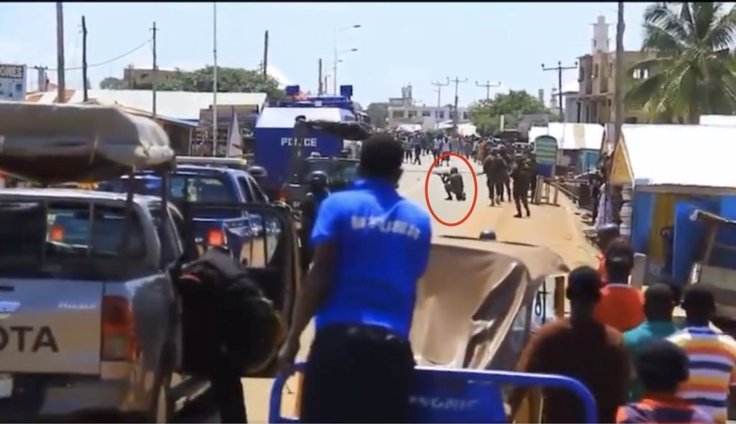
Audio By Carbonatix
Security analyst Prof. Emmanuel Kwesi Aning says the military is once again being used as a scapegoat for political failures.
This is his reaction to portions of the Ejura Committee report that called for a review of the actions of the Military team led by Lieutenant Martin Opoku Adusei in the Ejura disturbances.
Page 54 of the Committee's report stated:
"It is further recommended that the military establishment review the actions of the Section on the ground, led by Lieutenant Martin Opoku Adusei, for the inappropriate use of force, and apply appropriate sanctions".
Speaking on Prime Morning with Benjamin Akakpo on Tuesday, Prof. Aning said the military's role must be properly understood.
He said the army goes into situations not to resolve conflict but rather to solve a specific problem.
The Ashanti regional town of Ejura witnessed violence in June following the death of social activist, Mohammed Ibrahim, alias Kaaka. Residents poured onto the streets to protest. Military men were deployed by the Regional Minister to deal with the situation.
Two lives were lost, others were left with various injuries. President Akufo-Addo tasked the Interior Minister to allow a committee to probe the matter. The Committee has since issued its report raising issues about how the military used inappropriate force.
Prof. Aning said a lot had happened in the town that required the intervention of the Regional Minister who deployed the military. He explained that the beating of Kaaka, failure of those in authority to address the family's concerns, intelligence failure and later intervention of the Regional Minister, Simon Osei Mensah were flaws that worsened the situation.
He insisted the military is only called in when a situation has gotten out of hand. He, therefore, said criticism that the military shot into the crowd is misplaced. The blame, he argued, should be laid at the doorstep of the delayed intervention.
"The military is being used as a scapegoat for political failures and political security governance decision making"., he argued.
The Committee recommended adequate compensation for the families of the two deceased persons, namely, Abdul Nasir Yusif and Murtala Suraj Mohammed.
It also said Adequate compensation must also be paid to other injured persons, namely Louis Ayikpa (20 years), Awal Misbau (16 years) and Nasif Nuhu (30 years).
Prof. Aning says this compensation will only be adequate if those who failed in making appropriate decisions are punished.
"You can't compensate for a loss of life-based on the incompetence and irresponsibility of people who failed to take the decisions they should have taken.
"Probably the first step in compensating those people is to make sure that those who failed to make appropriate decisions are punished", he said.
Latest Stories
-
China’s BYD set to overtake Tesla as world’s top EV seller
2 minutes -
Joy FM’s iconic 90’s Jam returns tonight: Bigger, better, and packed with nostalgia
42 minutes -
Uproar as UG fees skyrocket by over 25% for 2025/2026 academic year
2 hours -
Japan PM joins fight for more female toilets in parliament
3 hours -
Ga Mantse declares war on fishing industry child labour
3 hours -
Adom FM’s ‘Strictly Highlife’ lights up La Palm with rhythm and nostalgia in unforgettable experience
4 hours -
OMCs slash fuel prices as cedi gains
5 hours -
Around 40 dead in Swiss ski resort bar fire, police say
6 hours -
AFCON 2025: Aubameyang and Nsue make history among oldest goalscorers
7 hours -
AFCON 2025: How Kwesi Appiah’s Sudan qualified for round of 16 without scoring any goal
8 hours -
Ghana is rising again – Mahama declares
8 hours -
Firefighters subdue blaze at Accra’s Tudu, officials warn of busy fire season ahead
9 hours -
Luv FM’s Family Party In The Park ends in grand style at Rattray park
9 hours -
Mahama targets digital schools, universal healthcare, and food self-sufficiency in 2026
9 hours -
Ghana’s global image boosted by our world-acclaimed reset agenda – Mahama
9 hours

